|
In 1970 Play for Today took over from The Wednesday Play, as BBC1’s premier slot for new plays, sometimes adapted from other media, often original works for television. The plays all started at the same time each week – most often at 9.25pm on a Tuesday, after the Nine O’Clock News. Timing was flexible, though usually between fifty and a hundred minutes, occasionally shorter or longer. Other than what you might read in your newspaper or that week’s Radio Times, you often had little idea as to what you might be sitting down to watch. You could be in for a comedy or a tragedy, something traditional in style or something more visually or narratively experimental, something shot in the studio on videotape (often with location scenes shot on film) or something entirely generated on celluloid, a feature film in all but name and size of screen.
Over three hundred Plays for Today were made between 1970 and 1984. The series has a rich heritage, being an intended showcase for new writers but also hosting work by established names such as Dennis Potter and directors like Ken Loach, Stephen Frears and Mike Leigh, who had all made films for the cinema but the downturn of the local film industry meant that they spent most of the 1970s and the first half of the 1980s working for television.
The BFI has released two previous Blu-ray box sets of Plays for Today, seven in the first set from November 2020 and six in Volume 2, from May 2021, which was my first review for this site. Volume 3 has six more, which are presented over three discs and reviewed below.
After a generally successful first season, in October 1971 Play for Today returned for a second. The first play was Dennis Potter’s Traitor on the 14th and the second was Edna the Inebriate Woman (often rendered with a comma in the title, but there isn’t one onscreen) on the 21st, written by Jeremy Sandford. With these two plays, the strand broadcast seven days apart the winners of the BAFTA Awards for Best Actor (John Le Mesurier in Traitor) and, for Edna, Best Actress for Patricia Hayes and Best Drama Production. Sandford was nominated for Best Script but lost to, believe it or not, The Benny Hill Show. Edna was directed by Ted Kotcheff, who had made Wake in Fright in the first half of 1970 and shot the play in November and December of the same year. He had a good month: Wake in Fright opened in London (under its then international title of Outback) on 29 October, eight days after Edna was broadcast. Nine million people tuned in to that first broadcast, and the play remains one of the most celebrated of all Plays for Today.
Kotcheff was clearly able to adapt himself to his material, and there’s more than a shade of Ken Loach in this play, a character study of an alcoholic who would more recently be called a bag lady. The link is Sandford, who wrote Cathy Come Home, which Loach directed and which was broadcast in 1966 in the Wednesday Play slot.
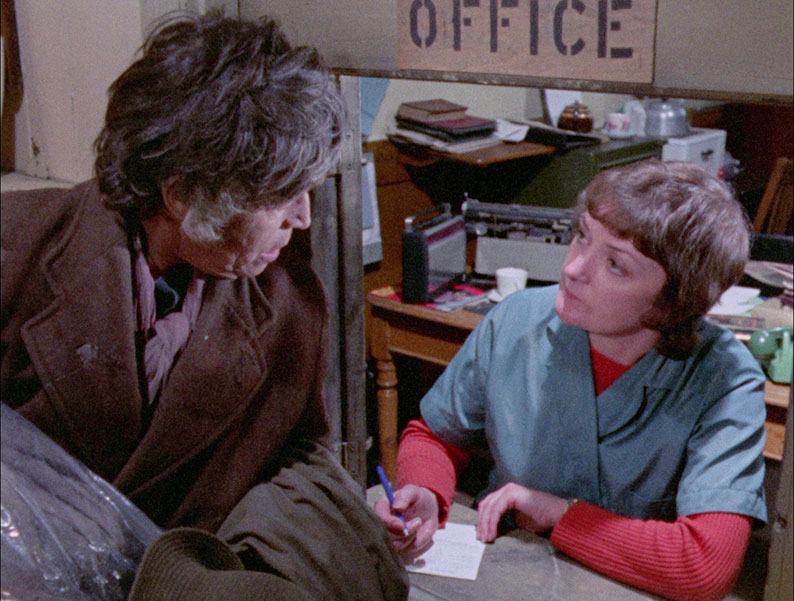
Cathy Come Home highlighted the issue of homelessness, and Edna does as well. Edna’s issues stem from a traumatic childhood gradually revealed to us. She moves from one institution to the next, but never stays for long. Only at a hostel run by Josie (Barbara Jefford) does Edna find some stability, though Josie herself receives pressure from others to move her on: the hostel should be a temporary solution for the likes of Edna, not a permanent one.
Sandford had researched the play by living rough for two weeks, twice, and inevitably the play was attacked on the grounds that someone like Edna should not be given our sympathy. It was not often, then as well as now, that someone like her was put at the centre of a television drama, not just an older woman but one on the margins of society. However, there’s a lot of humour, much of it of the black or gallows variety, and Patricia Hayes’s performance benefits strongly from her comedy background: she had been a regular in Hancock’s Half Hour, Till Death Us Do Part and others. Born in 1909, she turned sixty-one during the production. She had begun her career in the 1930s, with one appearance on pre-War television (J.B. Priestley’s When We Are Married, broadcast live from a theatre performance). She died in 1998. In Edna she had the role of a lifetime.
Although it provided a home for established writers, Play for Today was intended to provide one as well for new voices, often voices from little-heard-from communities or demographics. One such was Greenock-born Peter McDougall, a school-leaver at fourteen who had worked in the Glasgow shipyards and was working as a house painter in London when he met Colin Welland. Welland featured during the run of Play for Today as both a writer and an actor and, listening to McDougall talk about his life and background, encouraged him to write. McDougall wrote four Plays for Today. The first was Just Your Luck, directed by Mike Newell and first broadcast on 4 December 1972. The BFI’s Volume 2 contains the third and fourth, The Elephant’s Graveyard and Just a Boys’ Game.
Just Another Saturday, based on McDougall’s experiences as a teenaged drum major in Glasgow’s Orange March (by Protestant communities on 12 July each year, often opposed by Catholics), was the story that Welland encouraged McDougall to write. However, the Play for Today office rejected it: they were impressed by it, but found its subject matter too sensitive. They accepted Just Your Luck, though the sectarian divide was explored in that play too: a Protestant girl is pregnant by a Catholic boy. Meanwhile, director John Mackenzie took up the script of Just Another Saturday and was able to persuade the BBC to go ahead with the production, which was partly shot in Edinburgh to avoid controversy. Macdougall also acted as lead actor Jon Morrison’s mace-swinging hand double. This began a partnership between writer and director: Mackenzie would direct McDougall’s two further Plays for Today and also the McDougall-scripted A Sense of Freedom, premiered on television in the UK, released theatrically overseas. Just Another Saturday, first broadcast on 13 March 1975, won McDougall the Prix Italia. It was nominated for the BAFTA for Best Single Play, but lost to The Evacuees.
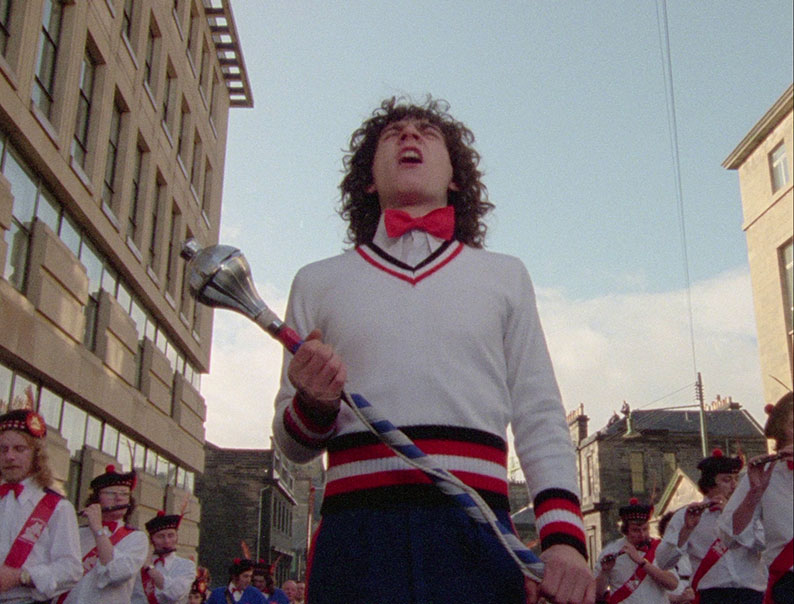
Like much of McDougall’s work, the play is character-led, with the change in its protagonist being an internal one: a disillusion with the divides around him and a growing sense that they, and Glasgow’s violent hard-man culture, is a dead end. John (Jon Morrison, billed as “John Morrison”), at first proud to be his local Orange Lodge marching band’s mace swinger, soon becomes disillusioned with the people on both side of the divide and is on his way to a realisation that this, and Glasgow’s drinking-and-fighting culture is a dead end. Much of this is conveyed by John’s father Dan (Bill Henderson) as a fast-moving and sometimes violent play reaches a deceptively quiet conclusion.
Macdougall’s strong suit, other than his insight into a culture he knew intimately, particularly into the men in that culture, is his dialogue, pungent and often funny – though without the profanity many of his characters would no doubt have used had the BBC allowed strong language to be broadcast in scripted drama at the time. Jon Morrison had only acted for a couple of years at this point, and this was his first lead role, but he commands the screen expertly, and there’s a strong supporting cast. The play attracted publicity for it being the first acting role for Billy Connolly, then primarily a stand-up comedian, though his is a supporting role: he appears just under an hour in. He plays Paddy, John’s Catholic friend, hinting that a younger generation may be finding more common cause than division. Unlike an older one: there are references to Glasgow having been a much more violent city decades earlier, with razor gangs roaming the streets in wartime. Morrison and Connolly went on to become the entire cast of McDougall’s next play, The Elephant’s Graveyard.
Many of Play for Today’s successes are rooted in a strong sense of a community. While there may be one or two lead characters, they are still part of the world the writer and director have created around them. So, if you’re watching these plays in order, you move from Protestant/Catholic divides in Glasgow to a Jewish community in Willesden, North-West London. Bar Mitzvah Boy, first broadcast on 14 September 1976. kicked off Play for Today’s seventh season and went on to win the BAFTA Award for Best Single Play. That made it two in a row for writer Jack Rosenthal, as he had won the same award the year before for The Evacuees. He would make it three the next year, with another Play for Today, Spend Spend Spend, broadcast just eleven plays after Bar Mitzvah Boy in season seven. Rosenthal had a prolific career, beginning in 1962 with contributions to That Was the Week That Was and ending just before his death in 2004, with an excursion to Hollywood by co-writing Yentl with that film’s star and director, Barbra Streisand.
Rosenthal’s plays frequently drew on his own Jewish background, and indeed most of the characters in Bar Mitzvah Boy (which the script included in this release reveals was originally to be called Shiva-Bocha Glory) are Jewish. However, as this is a view from inside, what could in other hands be seen as stereotypes are turned into characters by the sheer warmth of the writing and acting, not to forget sensitive direction by Michael Tuchner.
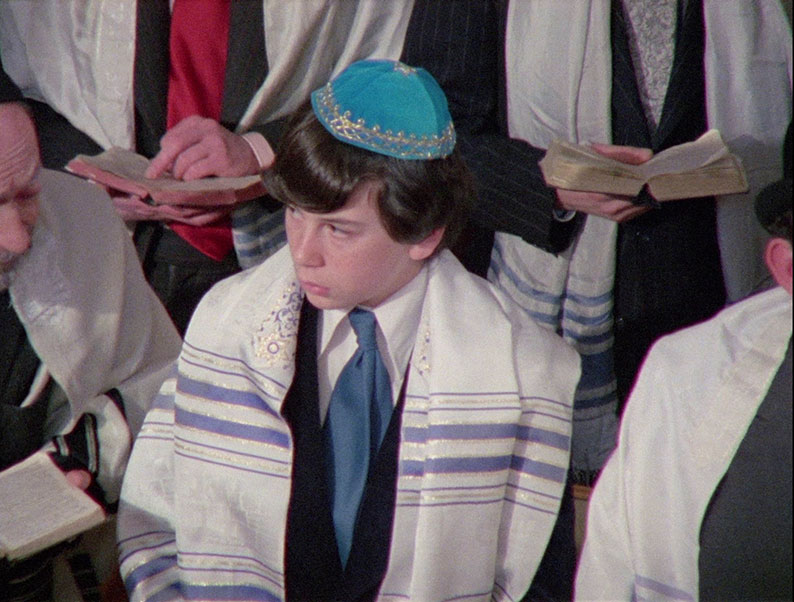
Eliot Green (Jeremy Steyn) is thirteen years old, and about to have his bar mitzvah, which marks the point where he ceases to be a boy and becomes a man. With over a hundred guests coming from all over the country to the celebratory dinner in the evening, Eliot’s home is a hive of activity as all prepare for the big day, especially Eliot’s mother Rita (Maria Charles) fretting herself into a frenzy that everything will go off perfectly. Meanwhile, Eliot, learning a portion of the Torah by heart, looks around him at the men in his life – his taxi-driver father Victor (Bernard Spear), his sister Lesley’s (Adrienne Posta) hapless boyfriend Harold (Jonathan Lynn) – and wonders if that is what being a man entails, does he want to be one?
What happens then I’ll leave you to find out, but the play has a turning point about halfway through, and in the face of possible disaster, Lesley helps save the day. Although like every Play for Today, Bar Mitzvah Boy was first broadcast post-watershed, it’s one of the most family-friendly of the entire run, and its popularity remains to this day, particularly among Britain’s Jewish communities. In 1978 it became a stage musical and in 2011 a radio play.
The Mayor’s Charity, broadcast on 29 November 1977 as part of the eight season, made the cover of that week’s Radio Times with its big-name cast no doubt having something to do with that. However, it’s fair to say it’s the least remembered of the plays in this set and is also the one that hasn’t to date had a repeat showing on broadcast television. It appeared during a strong run for Play for Today: earlier in the season there had been an early Stephen Poliakoff (Stronger than the Sun) and the first broadcast of Mike Leigh’s Abigail’s Party, possibly the most famous Play for Today of all, though it had originated on stage. Later in the season, there were in consecutive weeks, David Hare’s Licking Hitler, Red Shift by Alan Garner from his novel, and Jim Allen’s The Spongers. So it’s no wonder that The Mayor’s Charity, written by Henry Livings and directed by Mike Newell, was overshadowed. While it definitely has plenty to recommend it, an unsung classic it is not.
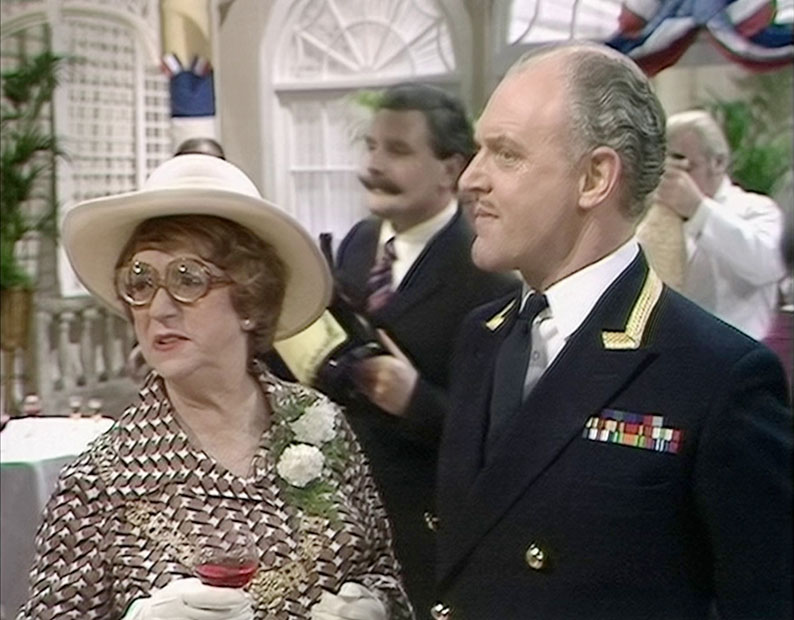
It takes place in a northern English town, though the location shoot took place in Dundee. It immediately echoes Just Another Saturday in opening with a marching band, but this time the band is led by someone much older – ex Warrant Officer Higham (Frank Windsor), war veteran in the RAF. He becomes the mace bearer for the town’s new mayor, Olive Major (Thora Hird). This appointment upsets many of the local dignitaries, particularly when it becomes clear that Higham has motives of his own.
Henry Livings (1929-1998) was an actor and a prolific writer, largely for the stage. His play Eh? was filmed in 1968 as Work is a Four Letter Word. That was his only film credit (he didn’t write the screenplay), but he worked on television from the early 1960s to the mid 1980s. The Mayor’s Charity was his only Play for Today. The audience reaction was disappointing, with some finding it difficult to follow. You can see why, and also see why a play which could benefit from repeated viewings might suffer when it was only intended for one broadcast and possibly a repeat within two years (which it didn’t get). Livings’s dialogue is dense, and his use of wordplay is evident, but characters and their motivations are a little opaque. That’s no fault of a strong cast, with Windsor in particular excelling as the stiff-backed Higham, whose exterior may be disguising a darker side. There’s certainly subtlety in the play but it may ultimately be too subtle for its own good.
Play for Today celebrated its fiftieth anniversary in 2020, with reshowings of selected plays on BBC Four and a new ninety-minute documentary, Making Drama Out of a Crisis. (That documentary making its way onto a future BFI Blu-ray set would be nice, but I suspect there will be issues with licensing the many extracts included.) However, there was an acknowledgement that the series reflected the biases of its time, as most of the directors and writers were white and male. In the entire fourteen-year-run, there was just one black director, Trinidad-born Horace Ové. A Hole in Babylon, which he directed and also co-wrote with Jim Hawkins, broadcast on 29 November 1979 and one of the 2020 BBC Four repeats, is his only contribution to the series. (Directors of colour of other ethnicities would include Indian-born Waris Hussein, who likewise directed just one Play for Today.) Ové in 1976 became the first black man to direct a UK feature film for cinema release, with Pressure, and you can see a poster for that film on the back of a door in A Hole in Babylon. No doubt the sight of a poster for Ousmane Sembène’s film Xala is intended as a tribute. In the 2022 New Year’s Honours List, Ové was knighted.
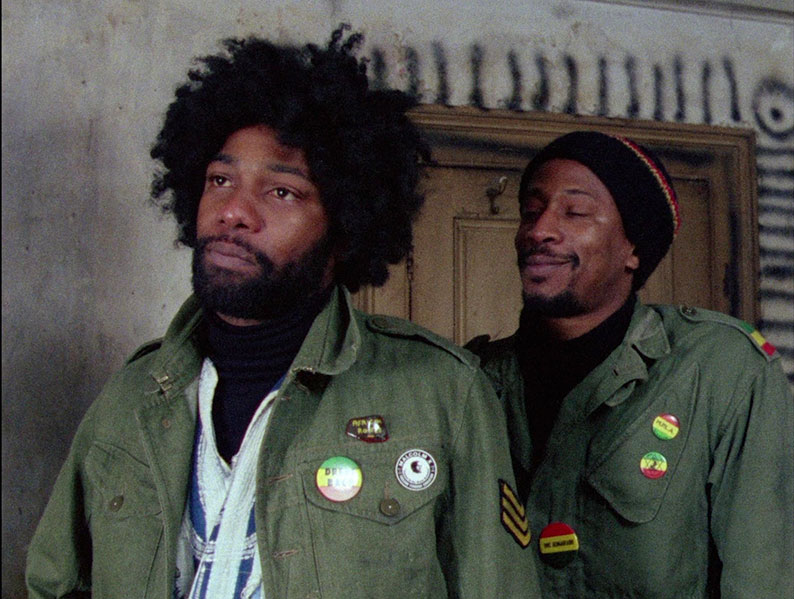
The play, broadcast on 29 November 1979, is based on true events. The Spaghetti House Siege took place between 28 September and 3 October 1975 at an Italian restaurant in Knightsbridge, London. Three gunmen, having been tipped off about the amount of money on site as the week’s takings on a Saturday night, raid the restaurant and hold the staff hostage in the basement. The gunmen are Frank Davies (T-Bone Wilson), just out of prison for armed robbery, Wesley Dick (Archie Pool) and Anthony Monroe, known as Bonsu (Trevor Thomas). As the police and journalists wait outside, the play fills in the background to the robbery and the three men’s previous lives, via flashbacks.
Ové tells the story documentary style, shooting on 16mm with very grainy results (Kenneth Macmillan was the DP), with onscreen captions giving names, dates and times, and at the end detailing the aftermath of the siege. He also cuts in actual BBC news footage. The disc includes the play’s script, and none of this is included in it, so presumably was added in editing. The play, running a tight 67 minutes, remains objective: the men are committing a crime, but it’s clear how they got there. There are some familiar faces in the supporting cast: Carmen Monroe as Bonsu’s mother, Floella Benjamin as Frank’s prison visitor, Michael Sheard as a racist prison officer and Johnny Shannon as a gambler.
The play was not without controversy: the Daily Mail ran a story claiming that it showed the three gunmen, then serving prison sentences, as “heroes” and allegedly there was pressure not to broadcast the play, but it went ahead. It was repeated in 1992 as part of a BBC season called Black and White in Colour and again in 2020 as part of the Play for Today fiftieth anniversary celebrations.
If writers and directors of colour were in a minority in Play for Today, the series also reflected its times in the presence of women in either capacity. Just twelve Plays for Today were directed by women, and five of those by one woman, Moira Armstrong. Another two were directed by Carol Wiseman, Dog Ends in 1984 and the present play, broadcast on 10 April 1979. There’s no reason why a woman should have to direct stories about women and not men, or vice versa, and Coming Out is very much a male story.
Coming Out, written by James Andrew Hall, also reflects its time by being a play featuring a minority group that is specifically about being one of that minority, rather than minority characters simply appearing in other stories. In this case, the minority represented are gay men. Homosexuality was a subject that had been at least implied on British television from the outset, with several productions of Patrick Hamilton’s play Rope (also the basis of the 1948 Hitchcock film) as far back as 1939, with an on-air content warning broadcast beforehand. There were other examples, such as the 1959 Granada TV (ITV) Play of the Week, South, starring Peter Wyngarde. By the 1970s, television could be bolder, with the first male/male kiss on British television on record between Ian McKellen and James Laurenson in a 1970 production of Christopher Marlowe’s Edward II. The first gay kiss between women took place between Alison Steadman and Myra Francis in the 1974 Second City Firsts play Girl, which again attracted controversy in the media and a content warning up front.
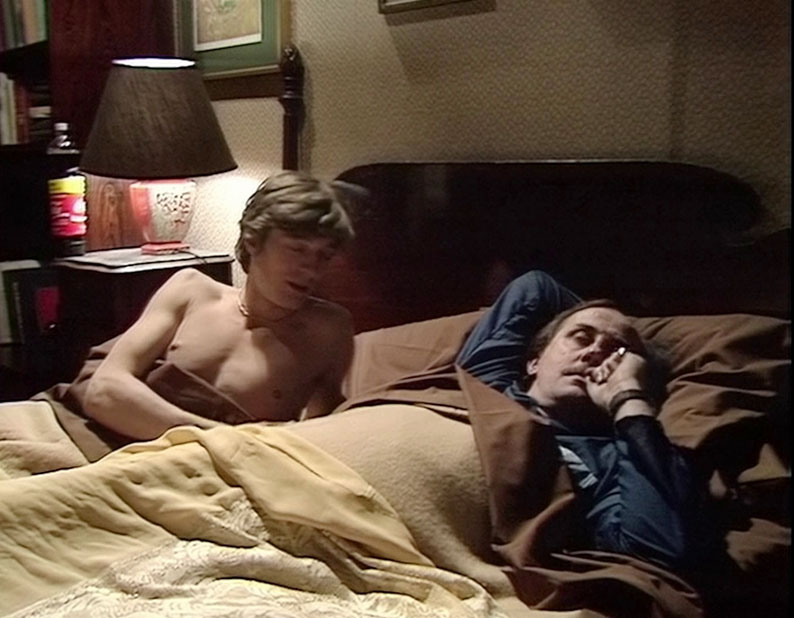
As it was a clear Subject of Concern, you’d expect Play for Today to deal with LGBTQ+ issues, and they did, beginning in its first series in 1971. Circle Line, which had won W. Stephen Gilbert a BBC Student Play competition, was broadcast just once and then wiped. It features its disaffected protagonist, living for the moment and outside conventional morality, casually sleeping with a fourteen-year-old boy, an experience both are seen to enjoy. Objections from the public were no doubt mitigated by a postal strike at the time, but the play did end up on Mary Whitehouse’s shit list for the year. Later in the decade, The Other Woman (1976) had dealt with lesbianism and Even Solomon (1979) had been the first British television drama with a transgender lead character. Even so, you can sense some understandable tentativeness in Coming Out. Most of the play’s lead male characters are gay, and the script includes a note to say that with one exception they are not to be played as camp or effeminate – all played by straight actors as a continuity announcement pointed out, which one viewer objected to. Needless to say, depictions of gay men, and anyone on the LGBTQ+ spectrum, have been much more outspoken since, but then back in 1979 the likes of Queer as Folk would have given many viewers apoplexies.
Lewis Duncan (Anton Rodgers), is a successful writer of (straight) romance novels. With a younger boyfriend, Richie (Nigel Havers), he’s known to his secretary Plaschke (Lynda Marchal, who steals every scene she’s in) and his friends as gay, but is not out to the public and has little time for gay activism. He writes an article under a pseudonym blaming gay men for promiscuity and victimhood. Fearing being outed by the literary establishment, he meets some of the letter writers, which leaves him to consider the dangers of staying in the closet, which include potential murder. Lewis is forced to reconsider his life.
Coming Out is a thoughtful, well acted play, that inevitably shows its age. Not everyone liked its portayal of gay life, some finding Lewis’s well-heeled lifestyle a bit far from reality, and some gay viewers finding the gay characters stereotypical. Yet the play was pioneering and deserves to be appreciated as such.
Play for Today Volume 3 is a three-disc Blu-ray release from the BFI. There are two plays to each disc, in the not-quite-chronological order I’ve reviewed them above. The discs are encoded for Region B only. The box set has a 15 certificate. Just Another Saturday, Bar Mitzvah Boy and Coming Out are rated 12, PG and 12 respectively from previous disc or streaming releases, but the other three do not appear on the BBFC database at the time of writing.
Being products of 1970s television, all six plays are presented in an aspect ratio of 1.33:1. Edna the Inebriate Woman, Just Another Saturday, Bar Mitzvah Boy and A Hole in Babylon were shot on 16mm colour film, and the transfers are at a resolution of 1080i derived from 2K scans of the original negatives. The results are fine, as colourful as they’re meant to be, with natural grain (quite a lot of grain in A Hole in Babylon, as I mention above). The Mayor’s Charity and Coming Out were studio productions shot mostly on 625-line PAL video (with some outside-broadcast video in The Mayor’s Charity) with some 16mm location scenes telecined in at the time of production. These two plays are presented at a resolution of 720p. As they come from standard-definition sources, upscaled, they look as good as they can do, given that we are watching on far larger and less forgiving devices than we would have been in the 1970s. All six plays run at the television speed of twenty-five frames per second.
All plays are in the original mono, rendered as LPCM 1.0, and are clear and well balanced. English hard-of-hearing subtitles are available, and will be of use to anyone, including non-native speakers of English, who may struggle with strong accents in Just Another Saturday and A Hole in Babylon especially. There are occasional typos (Eliot in Bar Mitzvah Boy, speaking French, refers to “les femmes neus” instead of “nues”) and a piece of music in The Mayor’s Charity is misidentified as “Tulips from Amsterdam” when it’s actually the “Merry Widow Waltz”. Otherwise, they’re mainly accurate.
[Update: Edna the Inebriate Woman and A Hole in Babylon have both been passed 15. The Mayor's Charity is a 12.]
Scripts
Presented on the disc, these were a feature of the plays in Volume 1, but for some reason weren’t included in Volume 2. But they’re back with Volume 3, and will be of particular interest to screenwriters as well as to historians. They are generally shooting scripts and contain cast and production information, and a note on Coming Out that the piece of music heard at the beginning and end (Julian Bream playing a Malcolm Arnold violin concerto) can only be cleared for the UK and Ireland, but it appears to be present and correct on this disc.
Image galleries (4:30, 2:18, 1:00)
One per disc, self-navigating. They contain production stills, in black and white and/or colour, with reproductions of the BBC’s Programme as Broadcast or Programme as Completed paperwork for each play.
Booklet
The BFI’s book, available in the first pressing only, runs to fifty-six pages plus the covers. There is no overview essay on Play for Today this time, presumably as most people picking this set up will have already bought the first two volumes and be up to speed with the series’s history. There are essays on each of the plays: on Edna the Inebriate Woman by Katie Crosson, Just Another Saturday by David Archibald, Bar Mitzvah Boy by Dr Julia Wagner, The Mayor’s Charity by Jon Dear, Coming Out by Simon McCallum and A Hole in Babylon by Kaleem Aftab. In addition, Peter McDougall writes about Just Another Saturday. These are all informative in regard to the productions and their reception and sometimes controversies, while acknowledging some flaws. Wagner and Aftab in particular locate the plays in the history of representation of Jewish and black communities respectively, and McCallum discusses Coming Out as part of the history of LGBTQ+ themes on television. Credits for the plays follow, and there are plenty of stills.
There were over three hundred Plays for Today broadcast between 1970 and 1984 and with this third volume, the BFI have released nineteen of them on disc. The six plays here include at least two all-time classics of the series. Given that other plays have been released elsewhere, and some no longer exist and others may not see a release due to rights and clearances issues, there is plenty of scope for future volumes in this series. Let’s hope so.
|